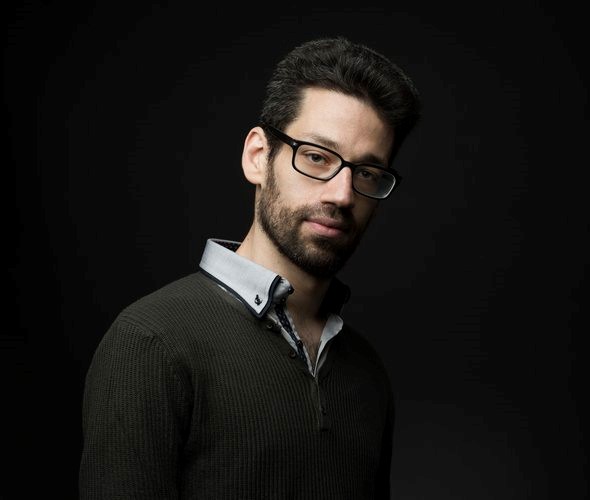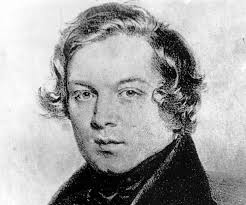People in the News
My Very Personal Connection to Robert Schumann
It took Robert Schumann just ten days to write his Ghost Variations; it took 85 years for them to be published.
He might have written them faster still had he not paused, on day nine, to throw his wedding ring, and then himself, into the Rhine. He was rescued by boatsmen and taken home, freezing and terrified. He was institutionalized the following week, at his own request; he died two years later, never having returned home. But first, before abandoning his house and his life as he had known it, he finished the Ghost Variations.
The suicide attempt may not have prevented Schumann from finishing the work, but it was responsible for the massive delay in its publication. Clara Schumann—bestower of the wedding ring he flung into the river, dedicatee of the work in question, and self-appointed guardian of Schumann’s legacy—insisted that it be suppressed. She knew what psychological state he was in when he wrote it, and she was adamant that no one else should see or hear the music that emerged from it.
Her protective instinct is understandable. As both one of the great musicians of her time, and the person who knew her husband best, she was uniquely well-positioned to know what he represented and thus the stakes involved in ensuring he remain in the most positive light. That she had lost him (she was more-or-less forbidden from seeing him in the asylum) was already devastating; that his music might be forgotten was not something that could be risked. If the pieces he wrote as his fragility became more than he could endure had to be collateral damage, then so be it.
A special connection
 For most of my life, I have felt not just love for, but a kinship with Schumann that I have struggled to understand, much less explain. Fifteen or even just five years ago, I would probably have said that it was the poetic aspect of his music that accounted for this—the way in which Schumann’s genius is not just a question of what he says but how he says it. His choice to linger, unnecessarily and so lovingly, on a note, or to elide it, circling it from above and below but never quite managing to touch it. Poetry is about finding the art and the profundity in the smallest turn of phrase, and Schumann, the truest tone-poet, achieved this as often and as disarmingly as any word-poet.
For most of my life, I have felt not just love for, but a kinship with Schumann that I have struggled to understand, much less explain. Fifteen or even just five years ago, I would probably have said that it was the poetic aspect of his music that accounted for this—the way in which Schumann’s genius is not just a question of what he says but how he says it. His choice to linger, unnecessarily and so lovingly, on a note, or to elide it, circling it from above and below but never quite managing to touch it. Poetry is about finding the art and the profundity in the smallest turn of phrase, and Schumann, the truest tone-poet, achieved this as often and as disarmingly as any word-poet.
I don’t think any of this is wrong, per se. Schumann’s poetic nature is extraordinary, and gives him access to corners of the human psyche that don’t generally get accessed. For me, a child and then adult who lived largely through music, this was a thing to be cherished. When living was lonely, or painful, or just subtly, indescribably wrong, there was Schumann to give voice to those feelings. What a gift.
But it is only in the last three years, as I have finally addressed—and, crucially, been forthright about—my life-long struggle with anxiety, that I truly understand why Schumann’s music has meant so much to me. It’s not merely a question of the things he expressed: It’s my knowledge that he was afraid to express them, that he was discouraged from expressing them.
Light begins to dawn
People often ask me when I first realized I had an issue with anxiety. This is not an easy question to answer, because anxiety is a spectrum—everyone has some of it, and no one knows what anyone else’s feels like. And so, having no internal mechanism to tell me whether it constituted a problem, I relied on the external—on how it looked. As long as no one else could see or hear it, I reasoned, it was fine. Or, if not fine, just a fact of life. For years, no one else could sense it. But eventually, everyone could, when I began to have full-fledged panic attacks on stage. The former brought a sense of isolation; the latter, shame.
Ironically, though, the visibility of my anxiety was a gift, as it forced me to address the monster I’d spent decades trying to will away.
 And so, my heart breaks for Schumann. I understand Beethoven’s deafness and Schubert’s destitution and illness as tragedies; I feel the horror of Schumann spending a lifetime parsing his music for signs of mental instability, and then purging them. (Twenty years before the Ghost Variations, he was already in the habit of editing his works post-publication, often removing the most distinctive and moving details.) I want to go back in time and tell him that I love him exactly as he is. And I want him to have lived in a world that viewed mental illness as a problem to be addressed, not hidden away.
And so, my heart breaks for Schumann. I understand Beethoven’s deafness and Schubert’s destitution and illness as tragedies; I feel the horror of Schumann spending a lifetime parsing his music for signs of mental instability, and then purging them. (Twenty years before the Ghost Variations, he was already in the habit of editing his works post-publication, often removing the most distinctive and moving details.) I want to go back in time and tell him that I love him exactly as he is. And I want him to have lived in a world that viewed mental illness as a problem to be addressed, not hidden away.
Because addressing my anxiety has dramatically changed the course of my life for the better. And because in facing it head on, I have come to understand that it is inextricably linked to the best parts of myself: the parts that make me the musician I am, that allow me to practice empathy, that allow me to listen, and connect, and feel.
The best, truest parts of Schumann are on display throughout the Ghost Variations. And yes, the most poetic parts. As Seamus Heaney wrote, poetry has “the power to persuade that vulnerable part of our consciousness of its rightness in spite of the evidence of wrongness all around it, the power to remind us…that our solitudes and distresses are creditable, in so far as they, too, are an earnest [part] of our veritable human being.” The vulnerability in the Ghost Variations is overwhelming; Schumann’s solitudes and distresses have nowhere to hide. But if you open your heart to it, the rightness of this music, and of the person that produced it, is undeniable. I am lucky to live in a world that has allowed me to embrace my own vulnerability, and to find myself in the process; how I wish Schumann had been given the same chance.
Jonathan Biss performs Schumann’s Ghost Variations on the Peoples’ Symphony Concerts series, Sunday, May 7, at 2 p.m., The Town Hall. Works by Beethoven and Mozart are also programmed. The virtual concert will be issued on May 8.
Jonathan Biss photo by Benjamin Ealovega





 FEATURED JOBS
FEATURED JOBS

 RENT A PHOTO
RENT A PHOTO


